Volcanism
Volcanism is the process through which magma, gases, and ash are expelled from the Earth's crust onto the surface, often resulting in the formation of volcanic landforms.
Types of Volcanoes
- Shield Volcanoes: Broad, gently sloping volcanoes formed by the eruption of low-viscosity lava flows.
- Stratovolcanoes (Composite Volcanoes): Steep-sided volcanoes built by alternating layers of lava flows, ash, and volcanic rocks.
- Cinder Cone Volcanoes: Steep-sided, small volcanoes formed from explosive eruptions that eject fragmented lava.
- Calderas: Large, crater-like depressions formed by the collapse of a volcano after an eruption or series of eruptions.
Volcanic Eruptions
Volcanic eruptions can vary in intensity and can be explosive or effusive. Factors that influence the type of eruption include the composition of the magma, the amount of dissolved gases, and the presence of water.
Effects of Volcanic Eruptions
- Lava Flows: Molten rock that moves across the Earth's surface, destroying everything in its path.
- Pyroclastic Flows: Rapidly moving, hot gas and rock fragments that can travel down the slopes of a volcano at high speeds.
- Ash Fall: Volcanic ash can blanket the surrounding area, causing respiratory problems and affecting agriculture.
- Gas Emissions: Volcanic gases, such as sulfur dioxide, can contribute to air pollution and acid rain.
- Climate Effects: Large eruptions can release enough ash and gases into the atmosphere to affect the Earth's climate.
Volcanic Landforms
Volcanic activity can lead to the formation of various landforms, including volcanic mountains, lava plateaus, volcanic islands, and volcanic craters.
Studying Volcanism
To understand volcanism, scientists study the composition of volcanic rocks, monitor seismic activity, measure gas emissions, and use remote sensing techniques to study volcanic landforms from afar.
Key Terms
- Magma
- Molten rock beneath the Earth's surface.
- Lava
- Magma that reaches the Earth's surface.
- Pyroclastic Flows
- Rapidly moving, hot gas and rock fragments.
- Caldera
- Large, crater-like depression formed by the collapse of a volcano.
Study Questions
- What are the different types of volcanoes and how are they formed?
- Explain the factors that influence the type of volcanic eruption.
- Discuss the effects of volcanic eruptions on the environment and human health.
- How do scientists study volcanism and volcanic activity?
◂Science Worksheets and Study Guides Third Grade. Changes in matter
Study Guide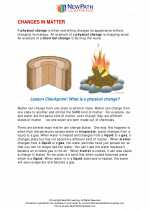 Changes in matter
Changes in matter  Worksheet/Answer key
Worksheet/Answer key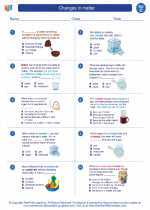 Changes in matter
Changes in matter  Worksheet/Answer key
Worksheet/Answer key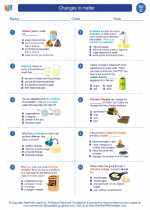 Changes in matter
Changes in matter  Worksheet/Answer key
Worksheet/Answer key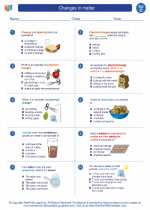 Changes in matter
Changes in matter  Vocabulary/Answer key
Vocabulary/Answer key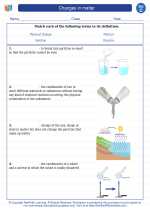 Changes in matter
Changes in matter 

 Worksheet/Answer key
Worksheet/Answer key
 Worksheet/Answer key
Worksheet/Answer key
 Worksheet/Answer key
Worksheet/Answer key
 Vocabulary/Answer key
Vocabulary/Answer key

The resources above cover the following skills:
Concepts of Physical Science: A student should understand and be able to apply the concepts, models, theories, universal principles, and facts that explain the physical world. A student who meets the content standard should:
Develop an understanding of the interactions between matter and energy, including physical, chemical, and nuclear changes, and the effects of these interactions on physical systems.